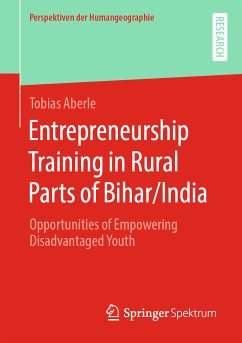Tobias Aberle examines how an entrepreneurship training helps disadvantaged youths in rural parts of Bihar, India, to cope with structural conditions that enable or constrain them. The present research reveals that young entrepreneurs can be divided into two groups: those who developed personal initiative and thus coped with limiting structural conditions very proactively, and those who solely behaved in a reactive way. For many entrepreneurs, the self-employed activity was only a Plan B, as in reality they sought for high-prestige career jobs. IFor entrepreneurship training to become a tool of empowerment, the range of training must be significantly adjusted in accordance with young trainees' social and educational backgrounds. In addition, a functioning ecosystem for entrepreneurship education must be in place, which ensures support for individual entrepreneurs through mentorship and networks.
Contents
- Approaching Youth from an Action-oriented Perspective
- A Category-based Analysis on Entrepreneurs in India
- Identifying Strategies for Livelihood Development
Target Groups
- Scholars and students of geography, educational sciences and economic sciences
- Specialists and executive staff in the field of international development cooperation
About the Author
Tobias Aberle holds a PhD in Geography and has devoted much of his research as well as voluntary commitment to India, making him a well-grounded expert for processes of social development in India and beyond.
Dieser Download kann aus rechtlichen Gründen nur mit Rechnungsadresse in A, B, BG, CY, CZ, D, DK, EW, E, FIN, F, GR, HR, H, IRL, I, LT, L, LR, M, NL, PL, P, R, S, SLO, SK ausgeliefert werden.









